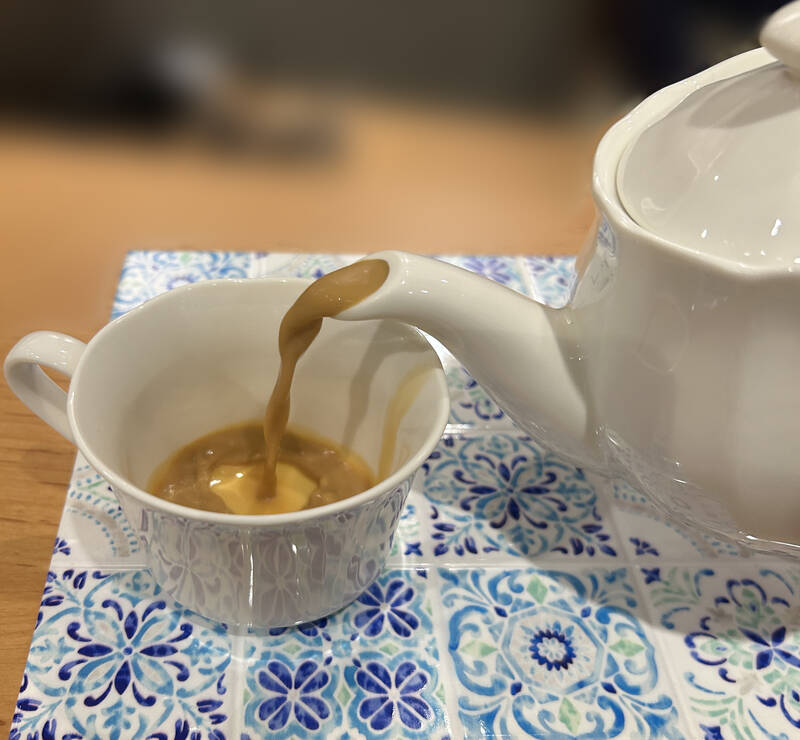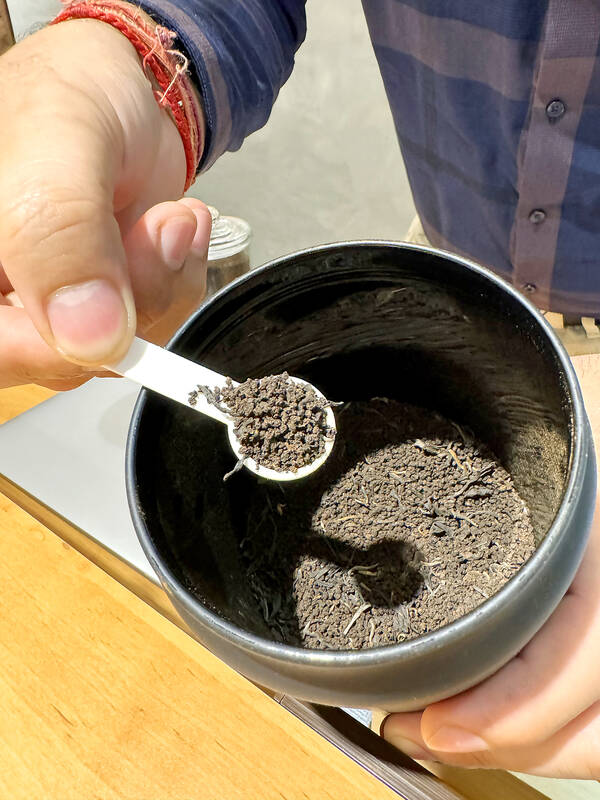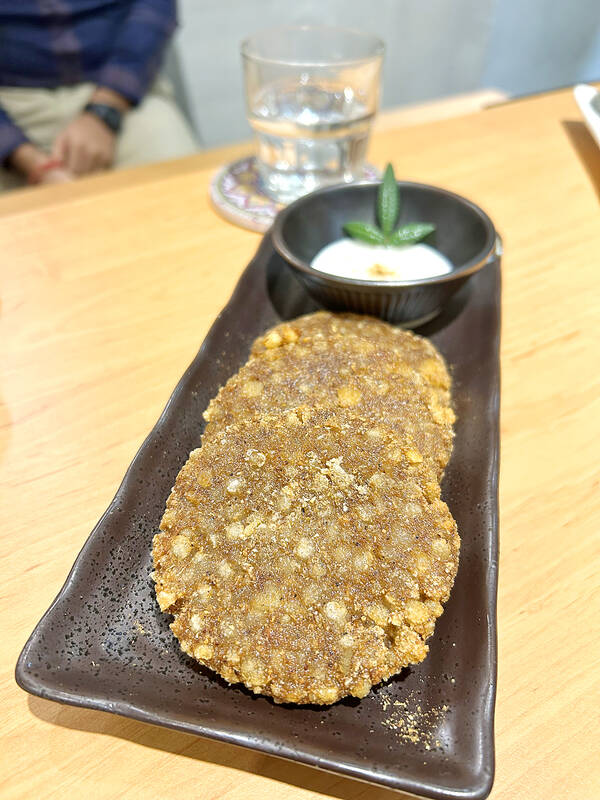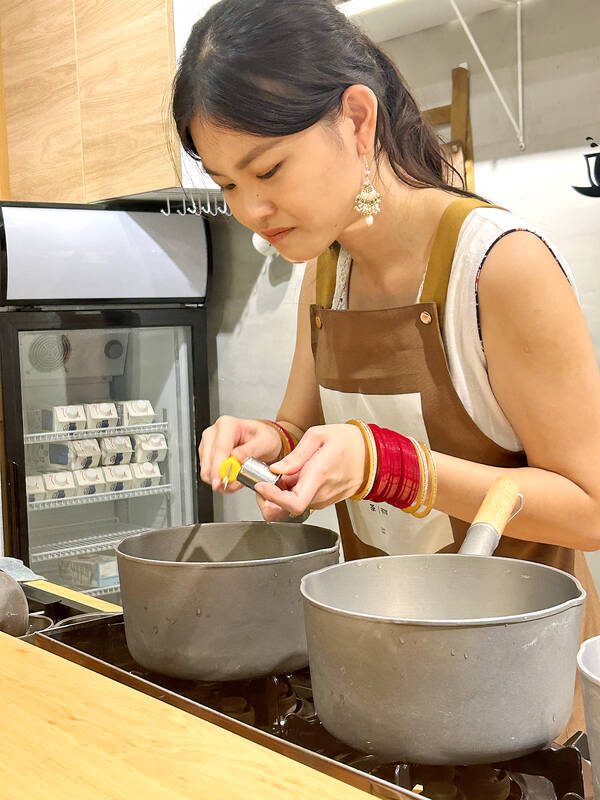Standing over a simmering pot of chai, Stella Ku’s (古詩筠) gold bangles jingle as she crushes ginger roots and mixes freshly ground cardamom into individual saucepans. The tea leaves, handpicked from the misty mountains of Assam and Darjeeling, take 10 minutes for the perfect brew.
Ku herself is from Taichung, but this recipe hails from generations of her husband’s family, the skills passed down to her by her mother-in-law and perfected over months of practice in Punjab, India.
Indus Chai in Daan District (大安) is a small family-run business, blending rich Indian traditions with Taiwan’s growing demand for gluten-free dining. This spot is a rarity: a celiac-owned and operated business with an entirely gluten-free menu. For us gluten-eaters, it’s a quiet spot to while away a rainy afternoon with owner Rajat Majitha, always keen to share his wealth of tea-related expertise over a mug of spicy chai.

Photo: Hollie Younger
Chai is the most consumed drink in India after water.
“We don’t have a common language, dress or culture, but what unites India is chai,” Majitha says.
British colonialists took tea from China to India and utilized the lush climate, fertile soil and, ultimately, cheap labor. For the British elite, 90 percent of the tea leaves ended as waste, discarded as a fine dust. But for poorer local tea farmers and factory workers, it was gold dust: cheap caffeine.

Photo: Hollie Younger
“India loves milk, and India loves spice,” says Majitha, which soothed the beverage’s bitterness as it spread across the country, sold from the shoulder poles of Chai Wallahs.
Today, chai is as much an art and a delicacy as its British-brewed ancestor. Majitha uses the world’s two best black teas, Darjeeling and Assam, which he hand-selects at auctions in India.
Indus Chai sells a range of brews, from fall specials with cinnamon and ginger to a green cardamom Elaichi Chai and their classic Masala Chai (all NT$340). Cardamom reduces body temperature for summer sipping, while ginger heats the body with a spicy kick. These China teapots of chai are expensive by Taipei standards, but each is made to order and uses only the best ingredients.

Photo: Hollie Younger
For the food options, I admittedly look to my celiac accomplice for her opinion; there’s a reason we typically use gluten for fluffy doughs and crispy batters. But the bread used for their Masala Sandwich (NT$260) is delivered by Taichung’s Kiseki Bakery and is pretty darn good, with the right balance of chewy and airy.
The samosa (NT$180) casing is crispier than expected, but it keeps the snack light with its heavy chickpea and potato-based filling. Without gluten as a binding agent, the chickpea, tapioca and rice flour dough cannot be folded or stretched. Majitha takes up to two hours each morning to hand-make the day’s samosas. My only complaint, why am I served Mexican-style salsa on the side when there exists such a thing as mango chutney?
The best snack is overwhelmingly the sabudana vada (NT$180), Indian-style hash browns served in thin discs with a mint-yogurt dip. These traditionally use tapioca pearls, an interesting use of Taipei’s beloved ingredient for desserts and bubble teas.

Photo: Hollie Younger
Celiac options in Taipei are extremely limited; there exists just a small selection of gluten-free restaurants and a discouragingly small Facebook group. Gluten-free diets appear to be incredibly rare here, due to genetic or lifestyle factors, when compared to Western capital cities. It’s not just noodles and bao buns to watch out for — gluten lurks in nigh-on everything Asian, from soy sauce to Taiwan Beer. But Majitha takes care to keep every process and every surface free from flour and contaminants, while Ku puts just as much love into each pot of chai.
Overall, Indus Chai delivers on its promise: exceptional tea, celiac-safe snacks, and a warm slice of India in the heart of Taipei.

Photo: Hollie Younger

On April 26, The Lancet published a letter from two doctors at Taichung-based China Medical University Hospital (CMUH) warning that “Taiwan’s Health Care System is on the Brink of Collapse.” The authors said that “Years of policy inaction and mismanagement of resources have led to the National Health Insurance system operating under unsustainable conditions.” The pushback was immediate. Errors in the paper were quickly identified and publicized, to discredit the authors (the hospital apologized). CNA reported that CMUH said the letter described Taiwan in 2021 as having 62 nurses per 10,000 people, when the correct number was 78 nurses per 10,000

As we live longer, our risk of cognitive impairment is increasing. How can we delay the onset of symptoms? Do we have to give up every indulgence or can small changes make a difference? We asked neurologists for tips on how to keep our brains healthy for life. TAKE CARE OF YOUR HEALTH “All of the sensible things that apply to bodily health apply to brain health,” says Suzanne O’Sullivan, a consultant in neurology at the National Hospital for Neurology and Neurosurgery in London, and the author of The Age of Diagnosis. “When you’re 20, you can get away with absolute

May 5 to May 11 What started out as friction between Taiwanese students at Taichung First High School and a Japanese head cook escalated dramatically over the first two weeks of May 1927. It began on April 30 when the cook’s wife knew that lotus starch used in that night’s dinner had rat feces in it, but failed to inform staff until the meal was already prepared. The students believed that her silence was intentional, and filed a complaint. The school’s Japanese administrators sided with the cook’s family, dismissing the students as troublemakers and clamping down on their freedoms — with

As Donald Trump’s executive order in March led to the shuttering of Voice of America (VOA) — the global broadcaster whose roots date back to the fight against Nazi propaganda — he quickly attracted support from figures not used to aligning themselves with any US administration. Trump had ordered the US Agency for Global Media, the federal agency that funds VOA and other groups promoting independent journalism overseas, to be “eliminated to the maximum extent consistent with applicable law.” The decision suddenly halted programming in 49 languages to more than 425 million people. In Moscow, Margarita Simonyan, the hardline editor-in-chief of the